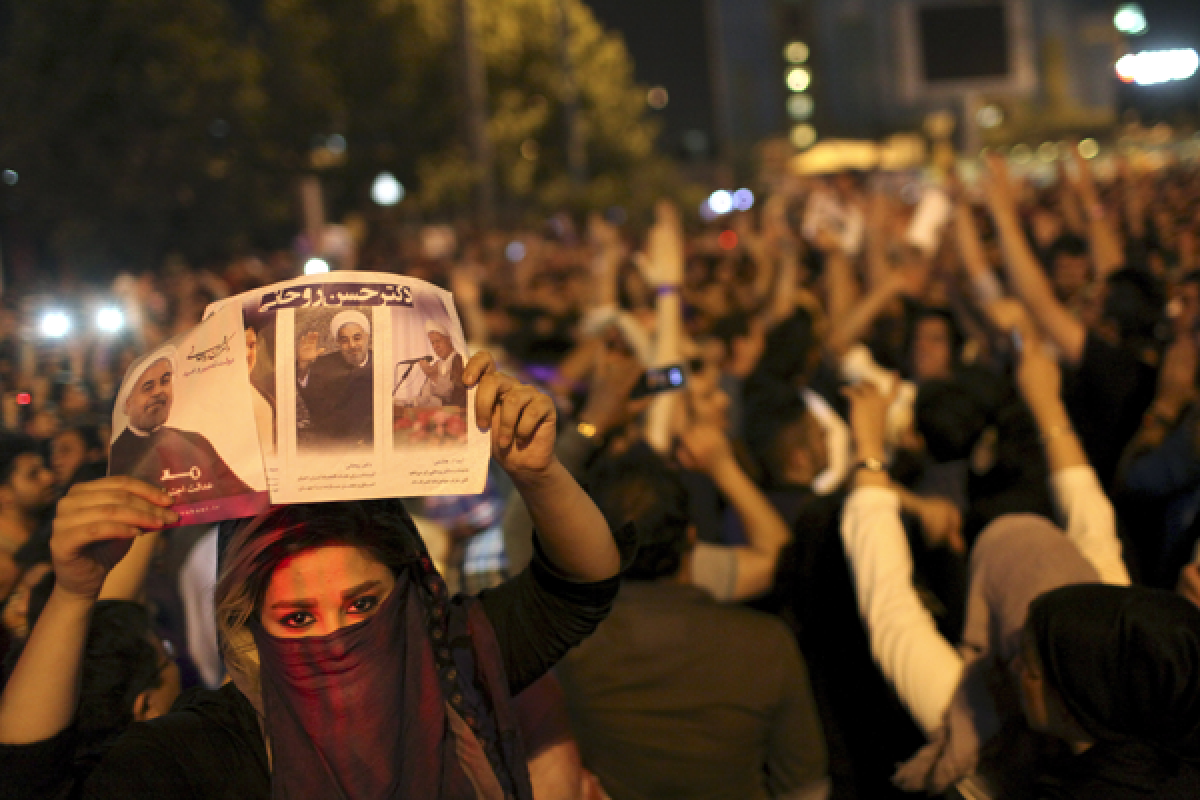Iran’s next president called ‘diplomat sheik’ by supporters

TEHRAN — A week ago, many observers viewed Iran’s presidential election as a horse-race among conservative hard-liners hostile to reform. Then came an unexpected surge in support for Hassan Rowhani, a soft-spoken, bespectacled and bearded cleric who is now improbably positioned to become the next president of the Islamic Republic.
Many of those who attended his animated campaign rallies were enthusiastic young people.
At one of his last rallies, a DJ fired up the crowd by playing “Yare Dabestani,” or “My Fellow Student,” which coincidentally — or not — was a revolutionary song popular among the opposition “green movement” that was crushed after Iran’s 2009 vote. Rowhani, 64, who voiced support for the 2009 protesters, took the stage and addressed the young crowd about citizens’ rights.
Rowhani is considered neither a hard-liner nor a radical reformist, but instead a centrist with conservative tendencies who has taken on increasingly moderate viewpoints in recent weeks.
His supporters call him the “diplomat sheik,” a term for the white-turbaned cleric’s role as a seasoned political player and conflict-resolution specialist in both the domestic and international arenas. There is hope that he will patch up Iran’s bitter internal political divisions as well as engage more with the international community to help ease sanctions and bring Iran in from the cold.
“I think Rowhani, as the ‘diplomat sheik,’ is a centrist and can make a national reconciliation cabinet and, after domestic reconciliation, he can go toward fixing Iran’s relations with the West,” said Saeed Laylaz, an economist close to former President Ali Akbar Hashemi Rafsanjani, Rowhani’s longtime mentor.
Rowhani is in a sense the antithesis to outgoing President Mahmoud Ahmadinejad, known for his fiery anti-Western diatribes and his divisive politics on the home front. The president-elect has assailed Ahmadinejad for not being able to stem galloping inflation and for “creating tensions” with the West.
“The difference of leadership between the two is from heaven to Earth,” said Amir Hossain Mottaghi, a political analyst and admirer.
The only cleric among the six candidates in the race, Rowhani once served as Iran’s nuclear negotiator, among other government positions over the last 30 years.
A jurist by education, Rowhani held a number of high-level defense posts during Iran’s brutal 1980-88 war with Iraq and served five terms in parliament, including a stint as deputy speaker, according to his official biography. From 1989 to 2005, he served as secretary of the Supreme National Security Council, Iran’s top security position, and he remains a council member. He is married and has four children.
Rowhani was born in November 1948 into a religious family in the town of Sorkheh, according to an official biography. He began his religious studies at the local seminary in the early 1960s before moving to Qom, Iran’s religious center.
At an early age, his biography states, Rowhani became an ardent opponent of the Western-backed secularizing shah and a committed supporter of Ayatollah Ruhollah Khomeini, then a leading dissident. By 1965, Rowhani was traveling across Iran denouncing the monarch, which resulted in him being arrested several times and banned from making public addresses.
Rowhani obtained his bachelor’s in law in 1972 from Tehran University and continued his studies in Britain, his campaign biography states. Later, he joined the then-exiled Khomeini and his revolutionary circle in France, becoming close to the eventual founder of the Islamic Republic.
He is considered a prolific writer on nuclear issues, including a 999-page tome on national security and diplomacy, released last year at the Tehran book fair.
In his book, Rowhani depicts himself as a mediator and unifier during his 678 days as the Islamic Republic’s nuclear negotiator.
During Rowhani’s 2003-05 tenure as Tehran’s representative in nuclear talks with European nations, Iran agreed to halt its enrichment of uranium for a period and was credited with a conciliatory approach. The fact that Western sanctions were not removed in reciprocal fashion was a lesson not forgotten by Rowhani, noted one observer.
Rowhani has made it clear that there was — and will be — “no surrender” to the West on Iran’s right to nuclear power, which the nation says is for peaceful purposes, like energy generation and cancer treatment.
“From the beginning, we focused our talks on defending Iran’s nuclear enrichment as its inalienable right,” he wrote in his book, endorsed by Ayatollah Ali Khamenei, Iran’s supreme leader and a longtime colleague. “It ... has been clear from the beginning that the hostile approach of the West with Iran will not end unless the country’s capability in the economic, political, scientific and technological fields reach a level that leaves the West with no option but to have fair and just relations with Iran.”
Once Ahmadinejad assumed office in 2005, Rowhani left the nuclear negotiator post and Iran restarted its uranium enrichment, ultimately expanding the process. The issue remains one of the critical challenges facing the new president.
Special correspondents Mostaghim reported from Tehran and Sandels from Beirut. Times staff writer Patrick J. McDonnell in Beirut contributed to this report.
More to Read
Sign up for Essential California
The most important California stories and recommendations in your inbox every morning.
You may occasionally receive promotional content from the Los Angeles Times.










